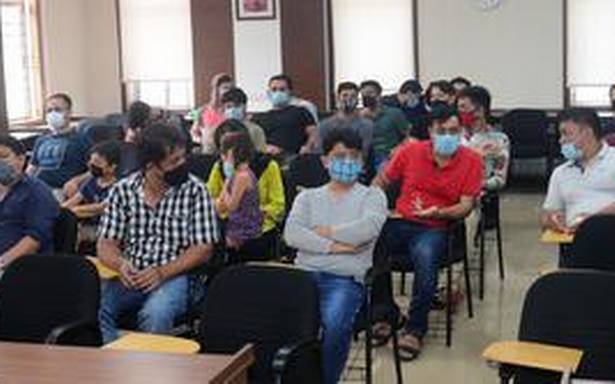The Centre’s excessive taxation of petrol and diesel amounts to an indirect infringement of the taxation rights of states and is curtailing their ability to spend on health, administration and justice delivery, Kerala finance minister K.N. Balagopal said in an interview.
The Union government is levying a big part of the central excise duty on auto fuels as cess, which is not being shared with state governments, the minister said.
“The central government’s stance on taxation of petrol and diesel is far from perfect. It is the central government that has unilaterally set high taxes on petrol and diesel in such a way that the entire proceeds from it do not go to the pool of tax revenue to be shared with states,” he said.
“The Centre’s tax on petrol and diesel, which were earlier less than ₹10 a litre, has now breached ₹30 a litre,” he said.
Kerala’s concerns about the high central excise duty burden on auto fuel, a part of which is levied in the form of cess, stems from the fact that the Centre does not share proceeds of cess with state governments. It transfers 41% of its net tax revenue, excluding the collection of cess, to states, according to a formula created by the Fifteenth Finance Commission.
The trend of the Centre increasingly relying on cess for revenue collection has irked many states. In the FY22 Union budget, a part of the customs duty on many items got converted into agriculture cess.
Tax transfers from the Centre to states is significant for state budgets.
Kerala is also facing a high unemployment rate and a drop in remittances, mainly from Gulf countries as many people have lost their jobs because of the pandemic.
Balagopal’s worries resonate with the concerns expressed by some other states. In May, Punjab finance minister Manpreet Singh Badal and Odisha chief minister Naveen Patnaik had criticized the Centre’s practice of levying cess on petrol and diesel.
At present, the bulk of the central excise duty on auto fuel, ₹20.5 a litre on petrol and ₹22 a litre on diesel, are levied collectively in the form of agriculture infrastructure development cess and road and infrastructure cess.
Select petroleum products and liquor were kept out of the ambit of the goods and services tax (GST) as these are the only limited sources of revenue mobilization by states, Balagopal said.
“Excessive taxation of these products by the Centre is an indirect infringement of states’ rights. It is affecting the revenue of states and is impacting the consumer,” he said. The Centre needs to correct this and Kerala is open to a discussion on this, the minister said.
The political debate over fuel taxes is becoming louder even as MPs are gearing up for the monsoon session of Parliament. Already, the GST Council has seen heated debates over state finances.
“The Union government on its own should correct the anomaly in its taxation of petrol and diesel. If revenue is shared with states in a fair manner, it will be a big relief to states,” said the Kerala finance minister.
High taxes on fuel is leading to high retail price, he added.
Union finance minister Nirmala Sitharaman has argued that both central and state governments have been levying taxes on auto fuel and that there is a need for a dialogue to address this.
Retail petrol price has been above ₹100 a litre in four metro cities since 7 July.




